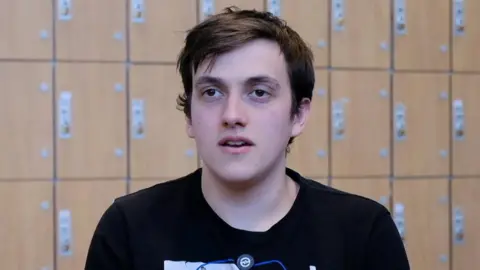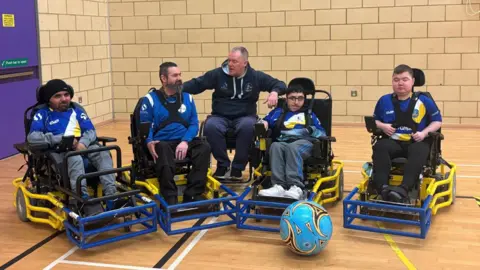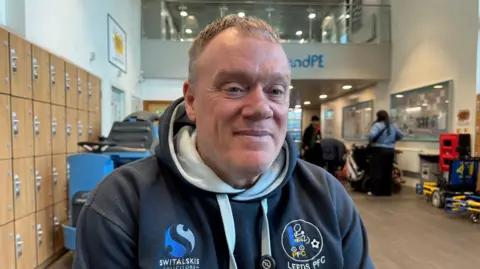'I never left the house until I found powerchair football'
 Obrey Zulu/BBC
Obrey Zulu/BBCPowerchair football - a version of the mainstream sport - has opened the door to the beautiful game for people with disabilities.
Lewis Harris, a sports science student at Leeds Trinity University, started playing for Leeds Powerchair Football Club eight years ago.
"Previously, I didn't get out of the house at all, I was just sitting in my bedroom all day," he said.
"It got me out every week and from there I've made friends, come to university, expanded and become more independent."
 Leeds Powerchair Football Club
Leeds Powerchair Football ClubThe 21-year-old, one of 49 players at Leeds PFC, plays in a position similar to goalkeeper in mainstream football.
He went on to play for England alongside one of his teammates, Daniel Rigby.
Mr Rigby, from Wakefield, said: "Not being able to play football properly, you're [usually] sat in a chair watching. So, it's a lot of fun playing rather than watching."
Powerchair football is for anyone who uses a powered wheelchair or has limited movement in a manual wheelchair.
It is played indoors with no crossbar and a slightly larger ball, and is "fast-paced, dynamic and very enjoyable to watch", according to the FA.
Paul Gorman, club secretary and coach at Leeds Chariots, said the value of the sport goes beyond the physical game.
 Obrey Zulu/BBC
Obrey Zulu/BBC"For players with life-limiting conditions, we've only got a short space of time sometimes to have an impact on their lives," he said.
"We need to pack in as much as we possibly can as quickly as we can. Football is the hook but there is an awful lot more that goes on."
The club was initially set up by parents who wanted to find a way for their children to play football about nine years ago.
Mr Gorman, who used to be involved with mainstream football, said there was "a lot of peer support between players, and between parents and carers".
The FA works with the Wheelchair Football Association to develop the sport, which as of 2019, had more than 100 clubs and 1,000 players across England.
Listen to highlights from South Yorkshire on BBC Sounds, catch up with the latest episode of Look North
